时间地点原因状语从句
- 格式:doc
- 大小:29.50 KB
- 文档页数:3
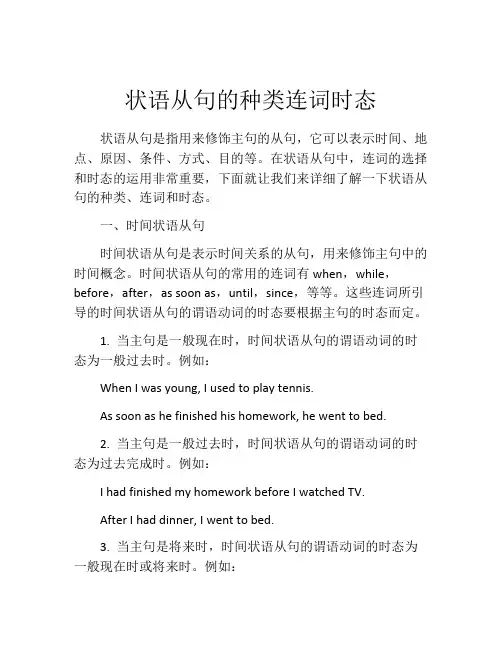
状语从句的种类连词时态状语从句是指用来修饰主句的从句,它可以表示时间、地点、原因、条件、方式、目的等。
在状语从句中,连词的选择和时态的运用非常重要,下面就让我们来详细了解一下状语从句的种类、连词和时态。
一、时间状语从句时间状语从句是表示时间关系的从句,用来修饰主句中的时间概念。
时间状语从句的常用的连词有when,while,before,after,as soon as,until,since,等等。
这些连词所引导的时间状语从句的谓语动词的时态要根据主句的时态而定。
1. 当主句是一般现在时,时间状语从句的谓语动词的时态为一般过去时。
例如:When I was young, I used to play tennis.As soon as he finished his homework, he went to bed.2. 当主句是一般过去时,时间状语从句的谓语动词的时态为过去完成时。
例如:I had finished my homework before I watched TV.After I had dinner, I went to bed.3. 当主句是将来时,时间状语从句的谓语动词的时态为一般现在时或将来时。
例如:I will call you as soon as I arrive in Shanghai.He will stay in New York until he finds a job.二、地点状语从句地点状语从句是表示地点关系的从句,用来修饰主句中的地点概念。
地点状语从句的常用的连词有where,wherever,等等。
这些连词所引导的地点状语从句的谓语动词的时态一般和主句保持一致。
例如:I will meet you where we agreed.Wherever you go, I will follow you.三、原因状语从句原因状语从句是表示原因关系的从句,用来修饰主句中的原因概念。
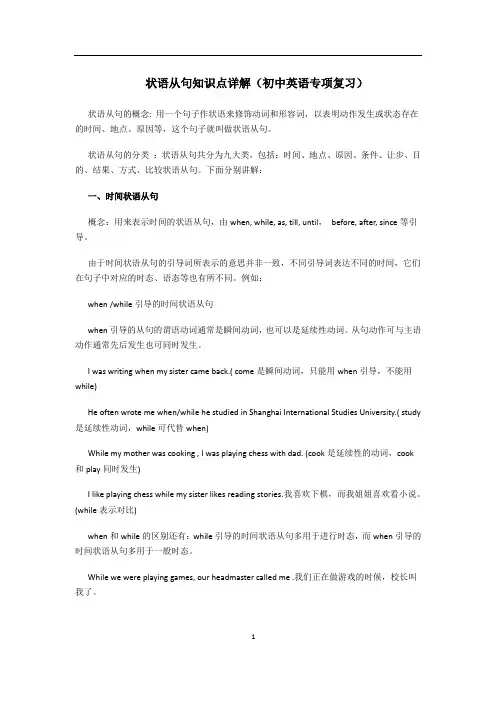
状语从句知识点详解(初中英语专项复习)状语从句的概念: 用一个句子作状语来修饰动词和形容词,以表明动作发生或状态存在的时间、地点、原因等,这个句子就叫做状语从句。
状语从句的分类:状语从句共分为九大类,包括:时间、地点、原因、条件、让步、目的、结果、方式、比较状语从句。
下面分别讲解:一、时间状语从句概念:用来表示时间的状语从句,由when, while, as, till, until,before, after, since等引导。
由于时间状语从句的引导词所表示的意思并非一致,不同引导词表达不同的时间,它们在句子中对应的时态、语态等也有所不同。
例如:when /while引导的时间状语从句when引导的从句的谓语动词通常是瞬间动词,也可以是延续性动词。
从句动作可与主语动作通常先后发生也可同时发生。
I was writing when my sister came back.( come是瞬间动词,只能用when引导,不能用while)He often wrote me when/while he studied in Shanghai International Studies University.( study 是延续性动词,while可代替when)While my mother was cooking , I was playing chess with dad. (cook是延续性的动词,cook和play同时发生)I like playing chess while my sister likes reading stories.我喜欢下棋,而我姐姐喜欢看小说。
(while表示对比)when和while的区别还有:while引导的时间状语从句多用于进行时态,而when引导的时间状语从句多用于一般时态。
While we were playing games, our headmaster called me .我们正在做游戏的时候,校长叫我了。
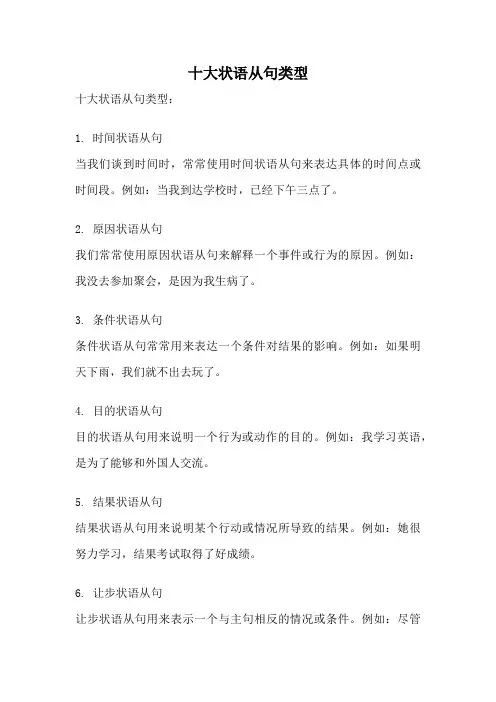
十大状语从句类型
十大状语从句类型:
1. 时间状语从句
当我们谈到时间时,常常使用时间状语从句来表达具体的时间点或时间段。
例如:当我到达学校时,已经下午三点了。
2. 原因状语从句
我们常常使用原因状语从句来解释一个事件或行为的原因。
例如:我没去参加聚会,是因为我生病了。
3. 条件状语从句
条件状语从句常常用来表达一个条件对结果的影响。
例如:如果明天下雨,我们就不出去玩了。
4. 目的状语从句
目的状语从句用来说明一个行为或动作的目的。
例如:我学习英语,是为了能够和外国人交流。
5. 结果状语从句
结果状语从句用来说明某个行动或情况所导致的结果。
例如:她很努力学习,结果考试取得了好成绩。
6. 让步状语从句
让步状语从句用来表示一个与主句相反的情况或条件。
例如:尽管
下雨了,但他还是出去跑步了。
7. 比较状语从句
比较状语从句用来表示两个或多个事物之间的比较。
例如:他比我更高大。
8. 方式状语从句
方式状语从句用来说明某个行动或动作的方式。
例如:他悄悄地走进房间。
9. 地点状语从句
地点状语从句用来说明某个行动或动作发生的地点。
例如:我们在公园里见面。
10. 比较状语从句
比较状语从句用来表示两个或多个事物之间的比较。
例如:她比我更聪明。
这是十大常见的状语从句类型,通过使用不同类型的状语从句,我们可以更加准确地表达我们的意思,使语言更加丰富多样。
同时,了解这些状语从句的用法也能够帮助我们更好地理解和使用复杂句子。

状语从句本质——用不同的连接词将主句与一个或几个分句连接起来,以表达主句与分句之间的逻辑关系。
主句分句连接词逻辑关系时间、地点、原因、目的、结果、条件、让步、比较、方式时间状语从句用来说明主句动作与从句动作发生时间上的先后关系类型常用连接词特殊连接词重点时间状语从句when, while, as, before,after, since, till, until,as soon as 名词:the moment, theinstant, the minute, theday, next time, everytime副词:instantly,immediately, directly 连词:no sooner …than,Hardly…when, scarcely …when 主句从句的时态搭配,延续性动词与非延续性动词的区别1. when 引导的时间状语从句可以理解为“当……的时候”时态搭配主从句都是过去时态主从句都用现在时态主句将来时态从句现在时态辨析The performer will already have played the music when we get there.The performer will be playing the music when we get there.是否可以用while 来替换?It is challenging for a company to remain inter-nationally competitive while the global economics are receding.※when, while, as 用法的区别when 相当于at that time ,引导的状语从句中谓语动词可以是延续性的也可以是非延续性的while ,as 相当于during that time, 引导的状语从句中谓语动词通常是延续性的随着英特网变得日益商业化,网络的使用对商人们非常有利。
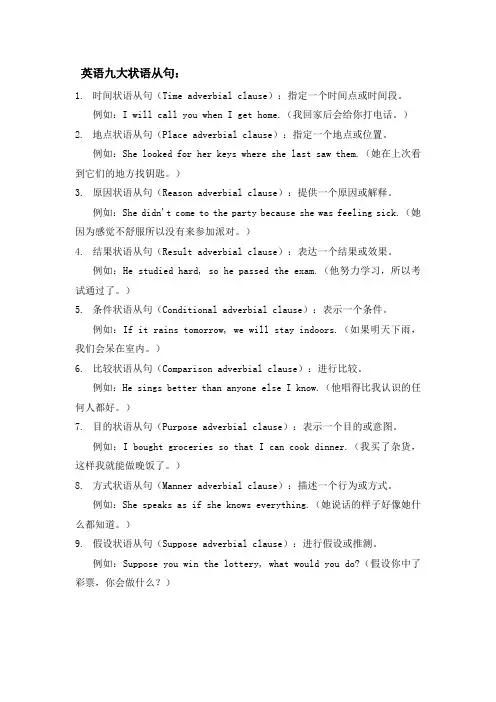
英语九大状语从句:1.时间状语从句(Time adverbial clause):指定一个时间点或时间段。
例如:I will call you when I get home.(我回家后会给你打电话。
)2.地点状语从句(Place adverbial clause):指定一个地点或位置。
例如:She looked for her keys where she last saw them.(她在上次看到它们的地方找钥匙。
)3.原因状语从句(Reason adverbial clause):提供一个原因或解释。
例如:She didn't come to the party because she was feeling sick.(她因为感觉不舒服所以没有来参加派对。
)4.结果状语从句(Result adverbial clause):表达一个结果或效果。
例如:He studied hard, so he passed the exam.(他努力学习,所以考试通过了。
)5.条件状语从句(Conditional adverbial clause):表示一个条件。
例如:If it rains tomorrow, we will stay indoors.(如果明天下雨,我们会呆在室内。
)6.比较状语从句(Comparison adverbial clause):进行比较。
例如:He sings better than anyone else I know.(他唱得比我认识的任何人都好。
)7.目的状语从句(Purpose adverbial clause):表示一个目的或意图。
例如:I bought groceries so that I can cook dinner.(我买了杂货,这样我就能做晚饭了。
)8.方式状语从句(Manner adverbial clause):描述一个行为或方式。
例如:She speaks as if she knows everything.(她说话的样子好像她什么都知道。
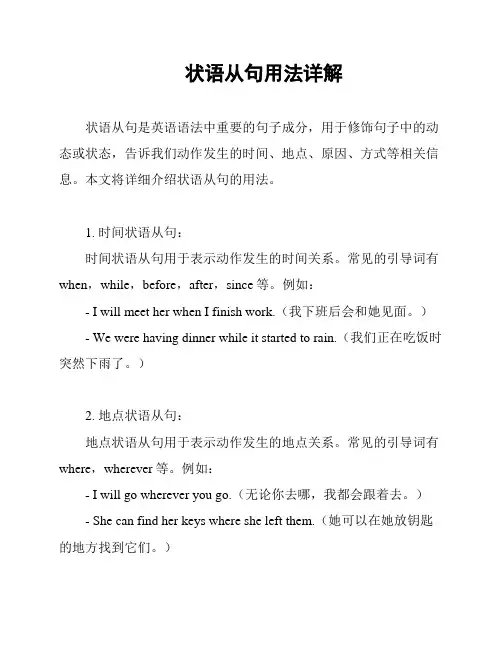
状语从句用法详解状语从句是英语语法中重要的句子成分,用于修饰句子中的动态或状态,告诉我们动作发生的时间、地点、原因、方式等相关信息。
本文将详细介绍状语从句的用法。
1. 时间状语从句:时间状语从句用于表示动作发生的时间关系。
常见的引导词有when,while,before,after,since等。
例如:- I will meet her when I finish work.(我下班后会和她见面。
)- We were having dinner while it started to rain.(我们正在吃饭时突然下雨了。
)2. 地点状语从句:地点状语从句用于表示动作发生的地点关系。
常见的引导词有where,wherever等。
例如:- I will go wherever you go.(无论你去哪,我都会跟着去。
)- She can find her keys where she left them.(她可以在她放钥匙的地方找到它们。
)3. 原因状语从句:原因状语从句用于表示某个动作或状态的原因。
常见的引导词有because,since,as等。
例如:- As it was getting late, we decided to leave.(由于时间很晚,我们决定离开。
)4. 方式状语从句:方式状语从句用于表示某个动作或状态的方式。
常见的引导词有as,like,as if等。
例如:- She danced as if nobody was watching.(她像没人看着一样跳舞。
)- He treats me like a princess.(他像对待公主一样对待我。
)需要注意的是,在使用状语从句时,需要注意主句和从句之间的时态和语序的一致性。
此外,状语从句通常位于主句之前或之后,但也可以放在主句的中间。
总结:状语从句是用于修饰句子中动态或状态的从句,用于表示时间、地点、原因、方式等相关信息。
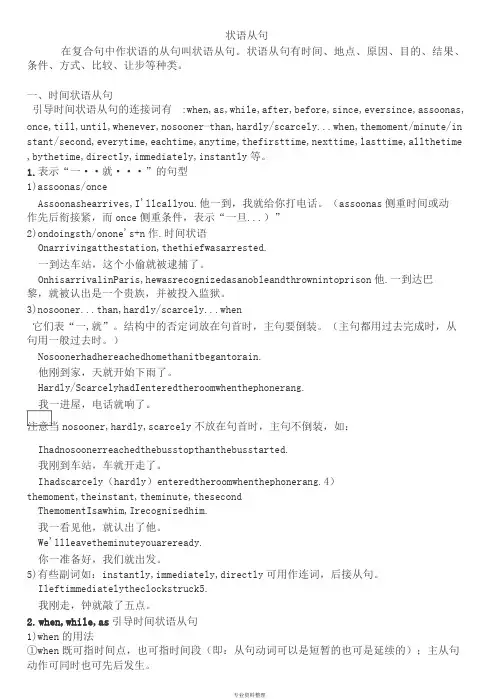
状语从句在复合句中作状语的从句叫状语从句。
状语从句有时间、地点、原因、目的、结果、条件、方式、比较、让步等种类。
一、时间状语从句引导时间状语从句的连接词有:when,as,while,after,before,since,eversince,assoonas, once,till,until,whenever,nosooner⋯than,hardly/scarcely...when,themoment/minute/in stant/second,everytime,eachtime,anytime,thefirsttime,nexttime,lasttime,allthetime ,bythetime,directly,immediately,instantly等。
1.表示“一··就···”的句型1)assoonas/onceAssoonashearrives,I'llcallyou.他一到,我就给你打电话。
(assoonas侧重时间或动作先后衔接紧,而once侧重条件,表示“一旦...)”2)ondoingsth/onone's+n作.时间状语Onarrivingatthestation,thethiefwasarrested.一到达车站,这个小偷就被逮捕了。
OnhisarrivalinParis,hewasrecognizedasanobleandthrownintoprison他.一到达巴黎,就被认出是一个贵族,并被投入监狱。
3)nosooner...than,hardly/scarcely...when它们表“一,就”。
结构中的否定词放在句首时,主句要倒装。
(主句都用过去完成时,从句用一般过去时。
)Nosoonerhadhereachedhomethanitbegantorain.他刚到家,天就开始下雨了。
Hardly/ScarcelyhadIenteredtheroomwhenthephonerang.我一进屋,电话就响了。

高中英语语法:状语从句知识点状语从句(adverbial clause)在句中作状语,可修饰主句中的动词、形容词和副词等。
状语从句由从属连词引导。
状语从句可放在句首或句末。
放在句首时,从句后面常用逗号;放在句末时,从句前面往往不用逗号。
状语从句根据它们的含义分为时间、地点、原因、目的、结果、方式、让步、条件、比较等九种。
一、时间状语从句1、while, when, whenever和as的用法比较(1)while常表示一段较长的时间或一个过程,强调主句的动词和从句的动词所表示的动作或状态是同时发生的。
它不能表示一时性或短暂的动作。
Don't talk so loud while( as) others are working.别人工作时,请勿大声说话。
(2)when引导的时间状语从句,可指时间的一点,也可以指一段时间,从句的谓语动词可用终止性动词,也可用持续性动词。
when引导的从句表示的具体的时间,从句的动作和主句的动作可以同时,也可以先于主句的动作。
Whenever指任何一个不具体的时间。
It was raining when we arrived. 我们到达时,天正下着雨。
(动作同时,指时间点)When you read the poem a second time, the meaning will become clearer to you.当你再读一遍这首诗,你就更清晰它的含意。
(动作有先后,指时间点,不能用while)Come whenever you like. 你爱什么时候来就什么时候来。
(3)as用as时主句和从句的动作往往同时发生,具有延伸意义,一般同延续性动词连用,有时可译作“一边…一边…”。
As time went on, his theory proved to be correct.随着时间的推移,他的理论被证明是正确的。
As(when)he finished the speech, the audience burst into applause.他讲话结束的时候,听众掌声雷动。
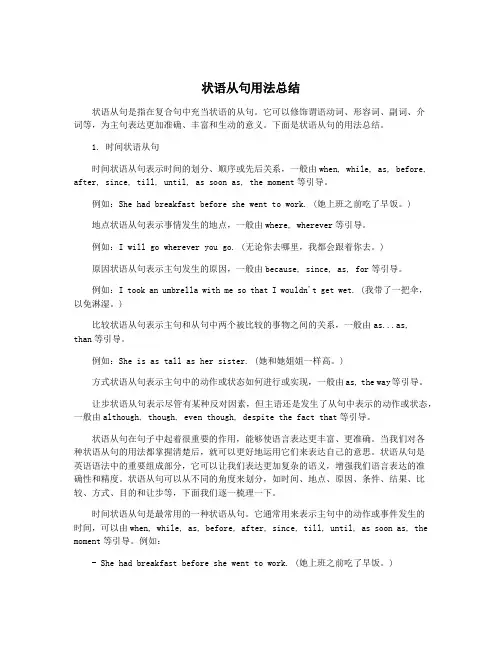
状语从句用法总结状语从句是指在复合句中充当状语的从句。
它可以修饰谓语动词、形容词、副词、介词等,为主句表达更加准确、丰富和生动的意义。
下面是状语从句的用法总结。
1. 时间状语从句时间状语从句表示时间的划分、顺序或先后关系,一般由when, while, as, before, after, since, till, until, as soon as, the moment等引导。
例如:She had breakfast before she went to work. (她上班之前吃了早饭。
)地点状语从句表示事情发生的地点,一般由where, wherever等引导。
例如:I will go wherever you go. (无论你去哪里,我都会跟着你去。
)原因状语从句表示主句发生的原因,一般由because, since, as, for等引导。
例如:I took an umbrella with me so that I wouldn't get wet. (我带了一把伞,以免淋湿。
)比较状语从句表示主句和从句中两个被比较的事物之间的关系,一般由as...as,than等引导。
例如:She is as tall as her sister. (她和她姐姐一样高。
)方式状语从句表示主句中的动作或状态如何进行或实现,一般由as, the way等引导。
让步状语从句表示尽管有某种反对因素,但主语还是发生了从句中表示的动作或状态,一般由although, though, even though, despite the fact that等引导。
状语从句在句子中起着很重要的作用,能够使语言表达更丰富、更准确。
当我们对各种状语从句的用法都掌握清楚后,就可以更好地运用它们来表达自己的意思。
状语从句是英语语法中的重要组成部分,它可以让我们表达更加复杂的语义,增强我们语言表达的准确性和精度。
状语从句可以从不同的角度来划分,如时间、地点、原因、条件、结果、比较、方式、目的和让步等,下面我们逐一梳理一下。
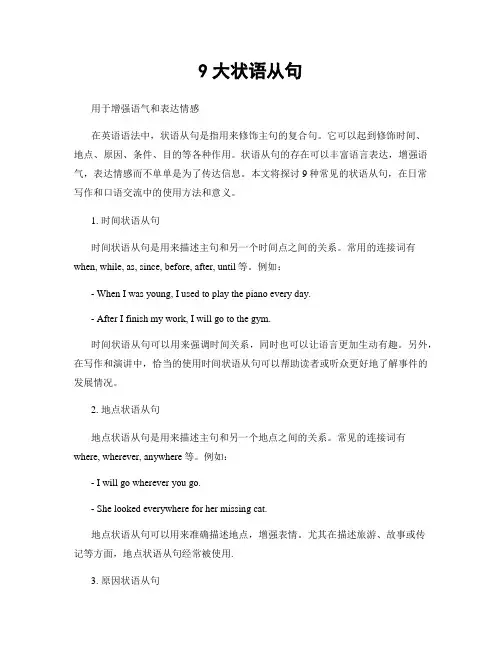
9大状语从句用于增强语气和表达情感在英语语法中,状语从句是指用来修饰主句的复合句。
它可以起到修饰时间、地点、原因、条件、目的等各种作用。
状语从句的存在可以丰富语言表达,增强语气,表达情感而不单单是为了传达信息。
本文将探讨9种常见的状语从句,在日常写作和口语交流中的使用方法和意义。
1. 时间状语从句时间状语从句是用来描述主句和另一个时间点之间的关系。
常用的连接词有when, while, as, since, before, after, until等。
例如:- When I was young, I used to play the piano every day.- After I finish my work, I will go to the gym.时间状语从句可以用来强调时间关系,同时也可以让语言更加生动有趣。
另外,在写作和演讲中,恰当的使用时间状语从句可以帮助读者或听众更好地了解事件的发展情况。
2. 地点状语从句地点状语从句是用来描述主句和另一个地点之间的关系。
常见的连接词有where, wherever, anywhere等。
例如:- I will go wherever you go.- She looked everywhere for her missing cat.地点状语从句可以用来准确描述地点,增强表情。
尤其在描述旅游、故事或传记等方面,地点状语从句经常被使用.3. 原因状语从句原因状语从句是用来描述主句和某个原因之间的关系。
常见的连接词有because, since, as, for等。
例如:- Because it was raining, I stayed at home last night.- I don't like to eat fish, for I am allergic to it.原因状语从句可以强调某个事件的原因,增强语气。
通过使用原因状语从句,写作者或者说话人可以清晰地表达某个事情的原因,使文章更加步入事实,增强可信程度。

完整版)状语从句(9种全)状语从句在复合句中起到修饰主句的作用,分为时间、地点、原因、目的、结果、条件、方式、比较、让步等种类。
1.时间状语从句时间状语从句的连接词包括when。
as。
while。
after。
before。
since。
ever since。
as soon as。
once。
till。
until。
whenever。
no sooner…than。
hardly/scarcely。
when。
the moment/minute/instant/second。
every time。
each time。
any time。
the first time。
next time。
last time。
all the time。
by the time。
directly。
immediately。
instantly等。
例如,“一···就···”的句型可以用as soon as或once引导,其中as soon as侧重时间或动作先后衔接紧,而once侧重条件,表示“一旦。
”;on doing sth/on one's + n.作时间状语,例如On arriving at the n。
the thief was arrested.意为“一到达车站,这个小偷就被逮捕了。
”2.地点状语从句地点状语从句的连接词包括where。
wherever。
anywhere。
everywhere等。
例如,I'll go wherever you go.意为“你去哪儿,我就跟你去哪儿。
”3.原因状语从句原因状语从句的连接词包括because。
since。
as。
now that。
seeing that。
considering that等。
例如,Since it's raining。
we'll stay indoors.意为“因为下雨,我们将待在室内。
状语从句的类型了解时间地点原因条件和方式状语从句状语从句是一个句子中充当状语的从句,用来修饰其他句子中的动词、形容词或副词。
其中,状语从句又可分为时间状语从句、地点状语从句、原因状语从句、条件状语从句和方式状语从句。
本文将详细介绍这五种状语从句的类型、用法和示例。
一、时间状语从句时间状语从句是指用来表示时间关系的从句,常用的引导词包括when、while、before、after、as soon as等。
它们可以说明一个动作发生的时间、顺序或同时性。
示例1:When I was young, I used to play in the park every day.当我年轻的时候,我每天都在公园里玩耍。
示例2:After I finish this article, I will start working on my presentation.在我完成这篇文章之后,我将开始着手准备我的演讲稿。
二、地点状语从句地点状语从句用来表示动作发生的地点或方位,常用的引导词包括where、wherever等。
示例:Wherever you go, I will always be with you.无论你去哪里,我都会始终陪伴在你身边。
三、原因状语从句原因状语从句用来说明一个动作或事件的原因,常用的引导词有because、since、as等。
示例:He couldn't attend the meeting because he was sick.他因为生病无法参加会议。
四、条件状语从句条件状语从句用来表示某个条件下发生的动作,常用的引导词有if、unless、as long as等。
示例:If it rains tomorrow, we will stay at home.如果明天下雨,我们将呆在家里。
五、方式状语从句方式状语从句用来说明动作或事件的方式或方法,常用的引导词有as、as if、as though等。
状语从句的时间原因条件等用法详解状语从句的时间、原因、条件等用法详解状语从句是复合句中的一种从属从句,用来修饰并限定主句,提供时间、原因、条件等信息。
掌握状语从句的用法,能够让我们的表达更加准确、流畅。
本文将详细解析状语从句的时间、原因、条件等用法。
一、时间状语从句时间状语从句用来描述动作或事件发生的时间。
常见的时间状语从句引导词有:when(当...的时候)、while(当...的时候)、as(当...的时候)、before(在...之前)、after(在...之后)等。
例如:1. I will call you when I arrive home.(我到家时会给你打电话。
)2. He fell asleep as the movie started.(电影刚开始他就睡着了。
)3. Before I leave, I need to finish my work.(在我离开之前,我需要完成我的工作。
)二、原因状语从句原因状语从句用来解释主句中的原因。
常见的原因状语从句引导词有:because(因为)、since(既然)、as(由于)、for(因为)等。
例如:1. He couldn't attend the meeting because he was sick.(他因为生病无法参加会议。
)2. Since you are not feeling well, you should rest at home.(既然你感觉不舒服,你应该在家休息。
)3. I didn't take the job as it didn't meet my requirements.(我没有接受这份工作,因为它不符合我的要求。
)三、条件状语从句条件状语从句用来表达某种条件下发生的情况。
常见的条件状语从句引导词有:if(如果)、unless(除非)、provided that(倘若)、as long as(只要)等。
状语从句的种类(九种)口诀:▪时地原因条状补,▪目比结果方让步,▪连词引导各不同;▪主句通常前面走,▪连词引导紧随后,▪从句若在主前头,▪主从之间有个逗。
用来修饰谓语动词、其它动词、定语、状语或整个句子的从句叫做状语从句。
状语从句可分为:1.时间状语从句;(adverbial clause of time)2.地点状语从句;(adverbial clause of place)3.原因状语从句;(adverbial clause of cause)4.条件状语从句;(adverbial clause of condition)5.目的状语从句;(adverbial clause of purpose)6.让步状语从句;(adverbial clause of concession)7.比较状语从句;(adverbial clause of comparison)8.方式状语从句;(adverbial clause of manner)9.结果状语从句。
(adverbial clause of result)§状语从句的时态特点一般情况下,时间和条件状语从句的谓语动词一般用“一般现在时”表示“一般将来时”,用“现在完成时”表示“将来完成时”。
例如:1.时间状语从句;(adverbial clause of time)①由when, while, as引导的时间状语从句。
例如:When we got home, I find Tom.While my wife was reading the newspaper, I was watching TV.We always sing as we walk.我们总是边走边唱。
②由before和after引导的时间状语从句。
It will be four days before they come back. 他们要过四天才能回来。
After you think it over, please let me know what you decide.你仔细考虑过以后,告诉我你是怎样决定的。
状语从句的9种形式状语从句是一种在句子中作状语的从句,它有9种形式:时间、地点、原因、条件、方式、让步、结果、比较和目的。
一、时间状语从句时间状语从句用来表示句子发生的时间,一般要用when或while引导:When I was a child, I used to play with my friends every day. 我小时候每天都和朋友玩耍。
While I was studying in the library, someone stole my bag. 我在图书馆学习时,有人偷了我的书包。
注意:在某些情况下,when和while可以互换使用,但不能混用。
二、地点状语从句地点状语从句表示句子发生的地点,一般要用where 引导:Where there is a will, there is a way. 有志者事竟成。
He lives where he works. 他住在他工作的地方。
三、原因状语从句原因状语从句表示句子发生的原因,一般要用why或because引导:Why she is late? 她为什么迟到?Because it was raining heavily, I couldn't get to school on time. 因为下着大雨,我上不了学。
四、条件状语从句条件状语从句表示句子发生的条件,一般要用if或unless引导:If you study hard, you'll pass the exam. 如果你努力学习,你就能通过考试。
Unless you work harder, you won't get better grades. 除非你更努力工作,否则你的分数不会提高。
五、方式状语从句方式状语从句表示句子的发生方式,一般要用as或how引导:As I said before, I'll help you with your project. 就像我之前说的,我会帮助你完成这个项目。
状语从句的时间地点和原因解析状语从句的时间、地点和原因解析状语从句是复合句中的一种从属性句子,用来修饰主句的时间、地点和原因等方面。
它在句子中起到了补充说明的作用,使整个句子更加丰富和准确。
本文将对状语从句的时间、地点和原因进行详细的解析。
一、状语从句的时间解析状语从句的时间状语用来表达动作发生的时间。
它可以在主句之前、之后或者与主句同时进行。
以下是一些常见的时间状语从句的引导词和用法:1. 当(引导时间点或条件)当我到达学校的时候,他已经离开了。
当地震发生时,人们立即逃离了家园。
2. 一……就(表示前后关系)一到放学,我就开始做作业了。
一觉醒来,他就发现自己在医院里。
3. 在……之前/之后(表示时间先后)在我搬家之前,请帮我照顾好我的猫。
在他离开之后,我们才敢开口说话。
二、状语从句的地点解析状语从句的地点状语用来说明动作发生的地点。
它可以告诉读者主句中的动作在哪里进行。
以下是一些常见的地点状语从句的引导词和用法:1. 在……的地方在我家附近有一家很好吃的餐馆。
在那个广场的角落里,有一个巨大的雕塑。
2. 到……地为止她一直走到学校的大门口才停下来。
他一直跑到山顶才休息下来。
3. 无论……都无论身在何处,他都会想念家乡的味道。
无论我走到哪里,我都会想起你的微笑。
三、状语从句的原因解析状语从句的原因状语用来解释主句的原因或理由。
它可以表达出动作发生的原因,让读者更加明了主句的目的。
以下是一些常见的原因状语从句的引导词和用法:1. 因为(强调原因)我没有去参加聚会,因为我生病了。
我没有见到他,因为他已经离开了。
2. 由于(指出原因)由于天气原因,比赛被取消了。
由于交通堵塞,他迟到了一小时。
3. 既然(表示已知情况)既然你不喜欢这本书,为什么还要买下来呢?既然你已经做了决定,我就不再多说了。
总结:状语从句的时间、地点和原因在句子中起到了重要的修饰作用。
通过时间状语从句,人们可以清楚地了解到动作发生的时间点;通过地点状语从句,人们可以明确地知道动作发生的地点;通过原因状语从句,人们可以了解到动作发生的原因。
地点状语从句
常用连词:where
特殊连词:wherever (在……的任何地方), anywhere, everywhere
【点拨】地点状语从句与定语从句的区别:where引导定语从句时,从句前应有一个表示地点的名词作先行词;而状语从句前则无需先行词。
Go back where you came from.(where引导地点状语从句)你从哪儿来回哪儿去。
Go back to the village where you came from. (where引导定语从句,修饰village)回到你来的那个村子里去。
时间状语从句
常用连词:when, as, while, as soon as, before, after, since , till, until, whenever (每当,一……就……)
特殊连词:the minute, the moment, the second, every time, the day, the instant, immediately, directly, no sooner ... than, hardly ... when, scarcely ... when 1.由when, while, as引导的时间状语从句when,while,as都有“当……时候”的意思。
1) when引导的从句的谓语动词既可以是延续性动词,又可以是瞬间性动词,并且when有时表示“就在那时”,相当于and at that time。
It was raining when we arrived. (指时间点)当我们到达的时候,天正在下雨。
When we were at school, we went to the library every day. (在一段时间内)
我们在学校上学的时候,每天都去图书馆。
We were about to leave when he came in.我们刚要离开,就在那时他进来了。
2) while引导的从句的谓语动词必须是延续性的,并强调主句和从句的动作同时发生(或者相对应),此外,while有时还可以表示对比。
I like playing football while you like playing basketball.
我喜欢踢足球,而你喜欢打篮球。
(对比)
He fell asleep while/when reading.看书的时候,他睡着了。
Strike while the iron is hot. (用as或when不可以,这里的while意思是“趁……”) 趁热打铁。
3) as表示“一边……一边”,as引导的句子的动词是延续性的动词,一般用于主句和从句动作同时发生;as也可以强调一先一后。
We always sing as we walk.我们总是边走边唱。
(as表示“一边……一边”)
Our headmaster laughed as she spoke.我们的校长边谈边笑。
2.由before“在……之前”和after“在……之后”引导的时间状语从句。
It will be four days before they come back.他们要过四天才能回来。
My father had left for Canada just before the letter arrived.
我父亲恰好在信到之前去加拿大了。
After you think it over, please let me know what you decide.
你仔细考虑过以后,请告诉我你是怎样决定的。
3.由till或until引导的时间状语从句。
其句型:...not + until + 短暂性动词;... (延续性动词)+until...
It was not until the meeting was over that he began to teach me English.
直到散会之后他才开始教我英语。
I worked until he came back. 我工作到他回来为止。
【点拨】not until...结构的强调和倒装
It was not until she had arrived home that she remembered her appointment with the doctor. 直到她到家才想起她和医生的约定。
Not until she had arrived home did she remember her appointment with the doctor. 直到她到家才想起她和医生的约定。
4.由since引导的时间状语从句。
Where have you been since I last saw you?自上次我和你见面以后,你到哪里去了?
It is four years since my sister lived in Beijing.我妹妹不在北京住有四年了。
【点拨】since引导的时间状语从句常用一般过去时。
5.由as soon as, immediately, directly, instantly, the moment, the instant, the minute, no sooner...than..., hardly...when...等引导的时间状语从句,这些连词都表示“一……就……”。
I will go there directly I have finished my breakfast一吃完早饭我就立即到那里去。
The moment I heard the news, I hastened to the spot
我一听到那个消息马上赶到了现场。
【点拨】表示突然发生某事或紧接着发生某事,常可译为“……还没/刚刚……就……”,“正在……忽然……”或“正要……这时……”,主要用于hardly/ scarcely…when…,no sooner…than…,be doing...when...和be about to do...when...这四个句式,前两个句型主句用过去完成时,从句用一般过去时。
I had hardly opened the door when the man hit me.我刚打开门,那个人就打了我一拳。
I was about to leave the room when the telephone rang我正要离开房间这时电话响了。
6.由the first (second/last) time, next time, any time, each time, every time, whenever, all the time, the whole time等引导的时间状语从句。
Whenever that man says “to tell the truth”, I suspect that he’s about to tell a lie.每当那个人说“实话说吧”的时候,我猜想他就要说谎了。
You grow younger every time I see you.每次遇到你,感觉你更年轻了。
原因状语从句
常用连词:because, since, as, now that(既然)等,for 表示因果关系时(它引导的不是从句)为并列连词,语气不如because强。
特殊连词:seeing that, in that, considering that, given that,considering
that, in as much as, in so much as
1.because引导的原因状语从句一般放于主句之后,because表示直接原因,语气最强,常回答why引导的疑问句。
I do it because I like it.我做这件事是因为我喜欢。
2.since引导的原因状语从句一般放于主句之前表示已知的、显然的理由(通常被翻译成“既然”),较为正式,语气比because弱。
Since you are free today,you had better help me with my mathematics.
既然今天你休息,你最好帮我补习数学。
【点拨】seeing (that), now (that), considering (that), in that这几个词汇与since 引导的原因状语从句意思相近,都表示“既然”。
Now (that) you are grown up, you should not rely on your parents.
既然你长大了,就不应该依靠你的父母了。
3.as引导原因状语从句时表示附带说明的“双方已知的原因”,语气比since弱,较为正式,位置较为灵活(常放于主句之前)。
As it is raining, you’d better take a taxi.既然在下雨,你最好乘出租汽车。
4.for是并列连词,连接并列句。
for引导的句子并不说明行为发生的直接原因,只提供一些辅助性的补充说明
He could not have seen me, for I was not there.
他不可能见过我,因为我不在那里。